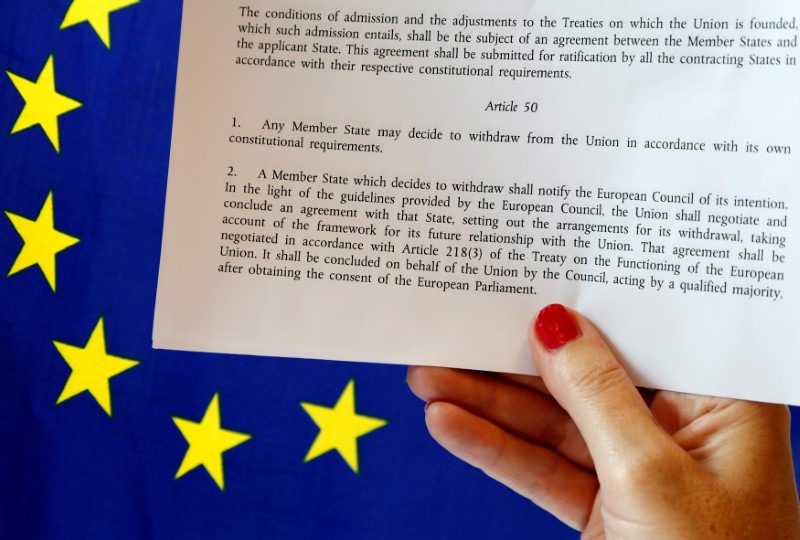By Michael Holden and William James
LONDON (Reuters) - Prime Minister Theresa May's plans to start the process of Britain leaving the European Union by the end of March are unlikely to be hindered or slowed by Tuesday's Supreme Court ruling the government must seek parliamentary approval.
In the ruling, judges on Britain's top judicial body upheld an earlier High Court decision that lawmakers had to give their assent before May can invoke Article 50 of the Lisbon Treaty which formally starts two-years of divorce talks.
However, the legal defeat, while an inconvenience and embarrassment for the government, is not expected to delay its Brexit timetable or, as some investors and pro-EU supporters hope, make it possible to stop Britain leaving the bloc.
Part of this is because the opposition is divided.
"We will not block Article 50," Jeremy Corbyn, leader of the main opposition Labour Party which campaigned against Brexit, said last week. "All Labour MPs (members of parliament) will be asked to vote in that direction next week, or whenever the vote comes up."
Not all Corbyn's colleagues may go along, but May can get the votes she needs for overall passage.
However, what the decision could do is give an opportunity for Labour and other lawmakers who oppose a "hard Brexit" - an agreement with the EU that puts immigration curbs above access to the single market - to have a greater influence on what the final deal should look like.
Senior ministers in May's Conservative government, which had been expecting to lose the case, have already drawn up a series of options, including a short, tight bill which will quickly be put before parliament's lower chamber, the House of Commons.
Although before June's referendum the vast majority of MPs in the Commons backed staying in the EU, most now say they would back Brexit, especially those in England and Wales whose constituents had strongly backed leaving the bloc.
MPs voted overwhelmingly to support the timetable of May's Conservative government for invoking Article 50 before April in a non-binding vote in December.
Sources from both May's ruling Conservatives and the opposition Labour Party have told Reuters there was scope for a bill to be accelerated through parliament, without restricting debate, to ensure it could pass before the end of March.
Labour, though, faces a particular problem as many of its traditional working class supporters voted to leave the bloc and have been wooed in recent years by the anti-EU UK Independence Party (UKIP).
Whilst not blocking Brexit, Corbyn, who himself was an EU critic for many years, has said he would fight for Britain to have full access to the single market "with reasonable management of migration".
Labour could try to amend any bill to ensure this, attracting support from some Conservative MPs, who oppose a "hard Brexit", and other smaller parties such as the Scottish Nationalists and Liberal Democrats.
The greatest potential threat to May comes from parliament's unelected upper chamber, the House of Lords, where many peers remained strongly opposed to Brexit and do not have voters to worry about.
If the Lords were to vote against approving the triggering of Article 50, the Brexit timetable could be severely delayed.
However, the government is confident the bill will pass through the Lords because there would be a constitutional crisis if unelected peers were to thwart the will of the people expressed both through the referendum and from their representatives in the Commons.
(editing by Guy Faulconbridge/Jermey Gaunt)
